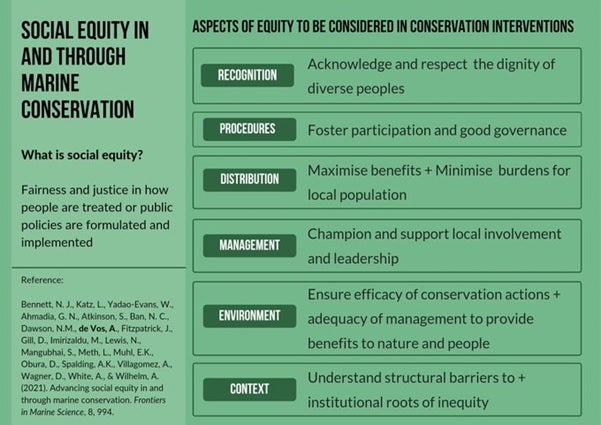
(photo credit: Ella-Kari Muhl)
What is social equity and why is it important in marine conservation?
Recently, I was part of a paper by the Blue Nature Alliance involving co-authors from different countries and different organisations, with diverse knowledge and experiences including academics, practitioners and PhD students like myself. We attempted to put into words how and why equity is central for successful marine conservation research, policy and practice.
So, what is social equity? We define it as “fairness and justice in how people are treated, or public policies are formulated and implemented.” Our paper re-imagines an approach that centers local knowledge, needs, and visions for improved long-term, sustainable marine conservation. This is not only ethical but important as across industry, academia, and within government organizations increasing attention and acknowledgment of a deeply embedded and problematic history of Western and colonial visions of conservation has shaped how and why we do conservation. This call to action for social equity to address and reshape conservation is supported by international conservation organisations and is central to ongoing negotiations for the Convention on Biological Diversity post-2020 targets.

We identified six elements of equity to offer practical guidelines for marine conservation policy and practice. These elements include;
- Recognition (i.e., the acknowledgement of rights for local groups),
- Procedures (i.e., effective participation of local groups to shape policy),
- Distribution (i.e., distributing benefits and burdens of conservation actions fairly),
- Management (i.e., local leadership in conservation management activities),
- Environment (i.e., ensuring environments and actions taken maintain ecological sustainability),
- Contextual or structural (i.e., address structural barriers that may inhibit equity rooted in surrounding social, economic, political and historical context that have and continue to influence equity for conservation initiatives).
We argue the marine conservation community and associated organisations must commit to the pursuit of socially equitable conservation. As Nathan Bennett, lead author of the study says, “We need more allies, not fewer, to achieve global marine conservation targets.”
Read more about Advancing social equity in and through marine conservation in Frontiers in Marine Science.